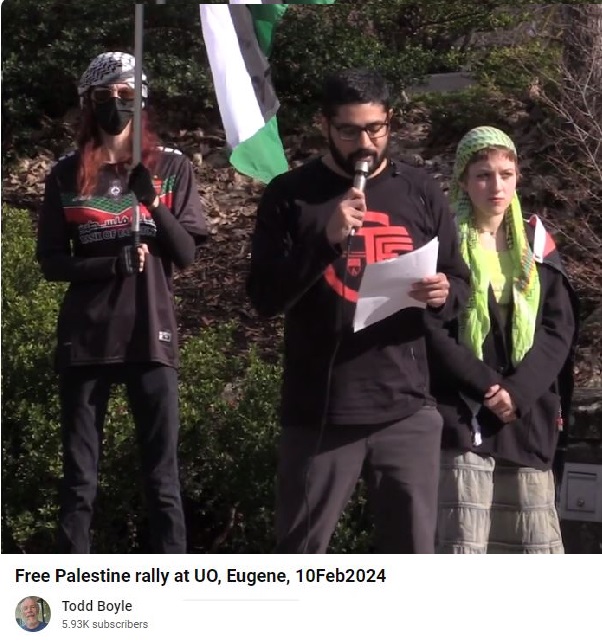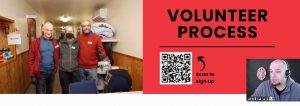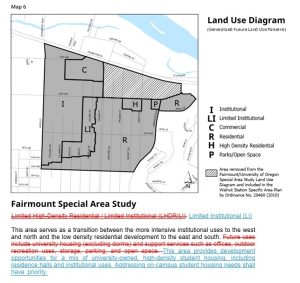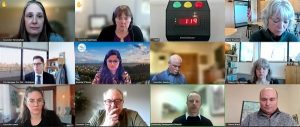UO ‘Free Palestine’ rally calls for HP divestment, Starbucks, Sabra boycotts
11 min read
KEPW News reporter Todd Boyle covered the ‘Free Palestine’ rally at the University of Oregon. On Feb. 10:
Rajeev: Hi everyone. It’s great to see everyone out here. It’s really important to be out here. My name is Rajeev. I’m the former president of the Graduate Teaching Fellows Federation, AFT Local 3544, which represents 1,300 graduate employees at UO.
[00:00:24] I want to start by acknowledging my Palestinian friends who have shaped my understanding of their struggle for self-determination and the art, culture, and beauty that they’ve shared with all of us.
[00:00:36] On the apartheid wall that separates the Palestinian West Bank from Israel, a wall that serves to segregate and take land, there’s a mural that shows two eyes looking out from a sprawling keffiyeh, and to the left of the mural it says, ‘To exist is to resist.’
[00:00:52] The Palestinian people, despite experiencing violent dispossession and displacement, having their homes demolished and sealed off, having their land confiscated and olive trees uprooted, despite being imprisoned and tortured and enduring targeted killings and unceasing bombardment, show the world every day what it means to exist and to resist.
[00:01:14] Every imaginable word has been used to describe the subjugation meted out to Palestinians through a settler-colonial project that ranges from total control and domination to outright elimination and erasure.
[00:01:27] During the current Israeli onslaught, former Israeli settler of Gaza and IDF soldiers have said that they want to “make Palestinians understand who owns the place.” Israeli officials and civilians have a longstanding practice of denying that Palestinian people even exist, going so far as saying that they are an invented people.
[00:01:50] Prime Minister Benjamin Netanyahu held up a map of the ‘New Middle East’ at the UN last September that showed the land between the Jordan River and Mediterranean Sea as Israel, without any mention of Palestinian land.
[00:02:05] This is a natural extension of the violent colonization underpinning the state of Israel that has involved a campaign of systematic erasure by destroying culturally and socially significant sites, changing the names of towns and villages, remaking landscapes, and going so far as restricting traditional foraging practices.
[00:02:27] But in the words of Palestinian UN Representative Nada Abu Tarbush: ‘Palestinians are a people who refuse to disappear.’ Tarbush said to Israel that nuclear threats and your bombs and your tanks and your bulldozers will never break the Palestinian people’s will to be free and to live in the dignity and peace in which all people are entitled.
[00:02:50] She also said something that often gets missed. She said, ‘Palestine has always been multiracial, multiethnic, multireligious, and people of Jewish faith have lived in historic Palestine as Palestinians for centuries and we consider them to be our brothers and our sisters.’
[00:03:08] When we chant ‘From the river to the sea, Palestine will be free,’ we are recognizing the legitimate Palestinian aspiration to restore access to their historic lands and to restore a reality that existed before colonization where Palestinian and Jewish people lived side by side. It is a call for common humanity against hatred, sectarianism, division, and essentialized identity.
[00:03:35] The historic struggle of Palestinians to mark their existence has become an example of resistance that has resonated across the world, from Chiapas to Kashmir and from Ireland to South Africa.
[00:03:49] Artists from Mexico connected to the Zapatista movement, which fought for land rights and autonomy among indigenous Mayan people, made the ‘To exist is to resist’ mural in the West Bank.
[00:04:00] Similar to these artists, people everywhere are making connections between struggles as part of this historic wave of sustained international solidarity with Palestine that we are living through and are part of.
[00:04:13] Experts, media, politicians who have contributed to the misery that is unfolding have consistently made declarations about being realistic and understanding what’s possible and what isn’t. It often sounds like they’re speaking in one voice, all of them using the same words again and again. But repeating lies doesn’t make them true and doesn’t determine what our shared future looks like.
[00:04:37] It’s on us, all of us, to make the unseen seen, to make the impossible possible, and to bring a new social reality into being. It is in the most dire circumstances when everything seems lost, when 1.2 million people have been forced into Rafah, when tens of thousands of bombs amounting to 65,000 tons have already been dropped, when there doesn’t seem to be a way forward—that’s precisely when we need to hold on to hope.
We have to believe that the weight of history, of colonialism, of empire, of subjugation and oppression can be toppled.
[00:05:17] I was reminded of a story of Irish solidarity with the South African anti-apartheid movement. It’s known as the Dunnes Store strike, where Mary Manning, a cashier at the store, refused to handle a grapefruit from apartheid South Africa. The shop steward, Karen Gearon, initiated a walkout and the strike involved nine other workers. They took up their union’s anti-apartheid resolution and engaged in a three-year-long strike, which was led by young workers and joined by leftists and radicals, workers who educated themselves about apartheid conditions.
[00:05:52] Every story of struggle and of existence through resistance involves the accumulation of seemingly small acts like this one that are needed to overcome seemingly insurmountable odds and power imbalances.
[00:06:06] So with that, let’s commit to focusing on what’s in front of us, guided by the goal of building a viable divestment campaign that identifies and targets all of the ways that the University of Oregon, the city of Eugene, the state of Oregon, and the organization and institutions around us are linked to Israel’s apartheid regime.
[00:06:27] And I’ll just end with a short poem. It’s by Faiz Ahmad Faiz, who is a Palestinian poet, and he wrote this. This is an excerpt, I just wanted to share this.
[00:06:41] ‘We shall witness. It is certain that we too shall witness the day that has been promised, of which has been written on the slate of eternity, when the enormous mountains of tyranny blow away like cotton under our feet, the feet of the oppressed, when the earth will pulsate deafeningly, and on the heads of our rulers when lightning will strike.’
[00:07:04] Free, free Palestine.
[00:07:17] Salem Younes (UO Students for Justice in Palestine): My name is Salem. I’m Palestinian. Within this movement, I have been questioned on many occasions how to get involved, what can be done, how to become more active in the movement of Palestinian liberation.
[00:07:32] To these questions and to those who ask for guidance and how to perform acts of solidarity and protests, I must first refer to a quote from Noam Chomsky:
‘How then does one become an activist? The easy answer would be to say that we do not become activists, we simply forget that we are. We are all born with compassion, generosity, and love for others inside us. We are all moved by injustice and discrimination. We are all, inside, concerned human beings. We all want to give more than to receive. We all want to live in a world where solidarity and companionship are more important values than individualism and selfishness. We all want to share beautiful things; experience joy, laughter, love; and experiment, together.’
[00:08:28] Compassion and love for others is extremely important to possess and to nurture. That being said, if asked how one can become involved and engaged in this movement, it is more than just compassion that is needed, but an understanding of the situation.
[00:08:43] The gross violations of human rights, the history of settler colonialism (not just in Palestine), and the continuous campaign of degradation and destruction of the land and the people, the effects and impact of colonial occupation in Palestine is not too complex to educate oneself on, there are many sources of media that give simple to more advanced explanations on the harmful implications and the historical layout of Israel’s occupation.
[00:09:09] Although the media we consume on a daily basis such as national news may be difficult to manage in the current state of censorship, but the knowledge exists and it’s out there for us to obtain, you might just have to dig a little deeper, a little extra effort. Not too much work to read an extra article, a book or two.
[00:09:29] Not as difficult as having no clean drinking water or electricity, such as the current conditions in Gaza.
[00:09:36] After gathering knowledge and educating yourself, what more can be done to combat these atrocities is through making an impact in collective change. We must address the systemic flaws that permit the siege of violence to continue. It is the investments, the funds from institutions like the U.S. government and its establishments that are actively enabling Israel’s onslaught of destruction.
[00:10:02] Through addressing the network of financial connections between the U.S. and Israel, we can begin to dismantle the very system of apartheid itself with removing its economic and relational support system.
[00:10:14] But let’s bring it back to where we are at this moment here at the University of Oregon. Allow me to ask you this: Are we, as students of the university, expected to ignore public displays of cruelty and mass genocide against an entire population of people?
[00:10:34] Is the student body, including its international student population, meant to disregard any crises or instances that exist outside the United States?
[00:10:48] Get some Starbucks coffee and some Sabra hummus on campus, send a few bucks to the Israeli military?
[00:10:57] Sabra, in case you’re unaware, is owned by the Strauss Group. The Strauss Group provides financial support and supplies to the Golani and Givati brigades of the Israeli military, which were found by the United Nations to be in stark violation of human rights and international law.
[00:11:15] So is the university in favor of replacing Sabra hummus with an alternative brand of hummus? Or are they more willing to continue their endorsement in offenders of international law and perpetrators of death and destruction? What’s easier?
[00:11:32] As an establishment whose primary role it is to educate their students, what awareness has the University of Oregon projected in response to the ongoing genocide?
[00:11:44] Have they invested in resources that support students through education and a structure that prioritizes safety and empowerment on campus? Or have they instead been investing in companies intent on furthering the destruction of indigenous territory, replacing Palestinian land with rubble, factories, and settlements?
[00:12:06] If you’re unaware, over 1.9 million individuals have been displaced, made refugees, and over 29,000 have been killed. And that is not including those that we have lost under the rubble and in the action.
[00:12:19] Netanyahu is forcibly pushing out 1.3 million Gazans from Rafah with nonstop bombing. His aim is to push them into Egypt. His goal is nakba, which is why we are here acting in firm opposition.
[00:12:37] The boycott movement, our divestments are entirely crucial to dismantling the systemic oppression enforced on Palestinians. If you support and invest in companies that contribute financially to the mobilization of Israel and their violations of international law and their intent on committing genocide, then you are advertently validating the horrific crimes against humanity committed by Israel in an attempt to extinguish, as Netanyahu addressed, all Palestinian lives.
[00:13:06] That being said, don’t buy into any feeble messaging from companies who claim good values when in reality, wholly contribute to the issue. Let’s take an example here from one of the University of Oregon’s investments, Hewlett-Packard, or HP, in which the University of Oregon has invested, have made statements such as the one published publicly on their main website. ‘As a matter of policy, we do not take sides in political disputes between countries or regions.’
[00:13:39] So, not taking a side in this situation to HP looks like providing servers to Israel for its population registry, in which IDs are issued based on one’s level of rights under Israel’s exclusionary system, in which Palestinians do not have the same level of rights as citizens, which in short means: They don’t have any.
[00:14:03] They are not given IDs, acknowledged as lesser, and undeserving of basic human rights while Jewish citizens are granted more rights and IDs to affirm their standing under occupation.
[00:14:15] In what products are used in specific, their Itanium servers are used to operate the Aviv system, the computerized database of Israel’s population and immigration authority. HP represents the backbone of Israel’s racial segregation tactics under their system of apartheid, with being the exclusive provider of computers to the Israeli military.
[00:14:37] And that’s not all. They’re so heavily unbiased in what side they assume they had to balance things out with providing servers and technology to aid Israel’s prison system. So if you’re wondering what that looks like, they play a crucial role in Israel’s mass incarceration project to assist in the oppression, harm and unjust imprisonment of many Palestinians.
[00:15:02] With these investments and more, it’s not hard to see things clearly. Education and compassion are far from the leading priorities of the University of Oregon. It seems as though interest lies solely in profit: profiting from the apartheid system of militant violence and occupation; profiting instead of preserving the lives of Palestinians.
[00:15:26] But we refuse ignorance and we refuse to be complacent with the actions or lack thereof of the university. This is a reflection of the values we possess not only as students, but aligned with our solidarity members.
[00:15:42] This is our call to action. As students of the U.S. educational institutions such as the University of Oregon, we must spread the BDS movement from campus to campus, make it known and enacted across the country.
[00:15:57] From the examples set by the students of the University of Michigan, we are addressing the Board of Trustees when we say, ‘We will continue to fight for divestment from any corporation intent on supporting the genocide of Palestinians.’
[00:16:17] To them I say ‘Shame on the companies who project funds to the apartheid operative of Israel. Shame.’
[00:16:26] If you still question the sheer power of this campaign, we are already seeing an impact with Starbucks’ share price facing a sharp decline since mid-November, falling by over 9%, which resulted in a decline of nearly $12 billion in market capitalization.
[00:16:43] If you think divestment doesn’t work, take a second look at the facts. The executives and CEOs of these companies are taking notice.
[00:16:55] Perspectives and ideals are changing whether it be through the influence of divestment or the pure shame of being involved.
[00:17:04] Palestinian liberation is the liberation of us all. As we continue to adapt and put pressure on this operative, we will make it known. We will not sit by and watch as the U.S. government contributes funds and supports the crime of genocide. We demand an end to this violent siege with dismantling the operation of financial support to the Israeli government. We will tear down the system of oppression in the process.
[00:17:37] Through each action, each effort, each concentration we take, we make more progress each day with collective action and the will of the people against the agenda of violence and destruction brings the termination of the apartheid system and an end to occupation.
[00:18:02] We will honor the martyrs in bringing an end to this, an end to the onslaught of violence and terror, for a world where Palestinians can live without confining to two labels, which is either ‘refugee’ or ‘dead.’
[00:18:19] For those we lost during the Nakba to the present day, we honor them. We will never forget them. For them we resist. Liberation is in our future—a free Palestine in our lifetime. Thanks.
Subscribe to Todd Boyle’s YouTube channel at https://www.youtube.com/@ToddBoyle.
UPDATE (Dec. 10, 2024): Update speaker name in transcript as requested by participant, consistent with SPJ Code of Ethics, Minimize harm.




